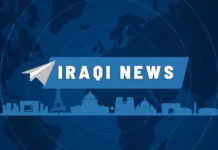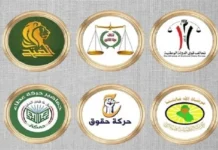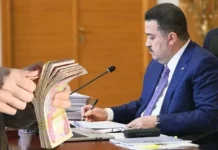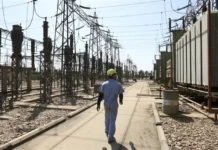Government Program And Economic Policies Revive The Dinar
Economic 07/28/2025 Baghdad: Anwar Ayed In its third year of implementation, the government program continues to make steady progress toward achieving its economic goals, despite the complex challenges posed by regional and international realities, particularly regarding the threat of war,fluctuations in energy markets, and volatile global economic cycles.
However, national growth indicators remain evident across various infrastructure sectors,
supported by remarkable levels of economic stability, most notably the annual inflation rate remaining below the 3 percent mark.
This indicates the ability of economic policy to absorb shocks and manage resources relatively efficiently.
qualitative transformations
In this context, Dr. Mazhar Mohammed Saleh, the Prime Minister’s financial advisor, told Al-Sabah that the parallel currency market has witnessed a qualitative transformation over the past period.
Previously, it was governed by “noisy patterns” that generated sudden price fluctuations.
Today, it has become more stable and is gradually being driven by the official market.
Saleh attributes this shift to the effective coordination between fiscal, monetary, and trade policies,
which contributed to the flow of accurate and well-thought-out information signals,
enabling the market to shift from a state of volatility and speculation to a calmer trading environment more in line with the country’s economic reality.
Integrated procedures
Saleh adds that this positive shift is the result of a series of integrated measures that have contributed to narrowing the gap between the official and parallel dollar rates, most notably the strict legal ban on dollar use in domestic transactions, particularly in the real estate market, which is one of the most sensitive sectors.
He added, “The transition to a mechanism for financing foreign trade through global correspondent banks, rather than relying exclusively on the central bank’s window, has contributed to reducing compliance risks and decreasing reliance on the informal market.”
Another factor that has contributed to enhanced market stability, the advisor said,is the entry of small importers into the official dollar financing network, without the need for money exchange companies.
This has facilitated their access to foreign currency at direct official exchange rates,
especially since their trade represents approximately 60 percent of the private sector’s foreign trade.
Administrative facilities
Dr. Saleh points out that this transformation was achieved through administrative facilitation provided by the government and the reduction of bureaucratic loopholes that previously hindered import financing and implementation.
The financial advisor emphasized that the expanding use of electronic payment cards in foreign currency, particularly among travelers, has been an additional factor in reducing pressure on the cash dollar, given the availability of cash allocations at the official exchange rate through banking outlets located throughout airports, and with flexible and organized compliance mechanisms.
He pointed to the role played by cooperative societies, food baskets, and construction goods, which are imported in dollars at the official exchange rate of 1,320 dinars, in supporting the price stability policy.
This has enabled the government to use trade as a tool to achieve monetary stability, as part of an integrated strategy for economic policies in implementing the government program.
Fluctuations in the US economy
In contrast, financial and economic expert Dr. Safwan Qusay pointed out that the Iraqi dinar, despite its relative resilience, remains vulnerable to the effects of global markets and fluctuations in the US economy. Speaking to Al-Sabah, he pointed out that the new customs restrictions imposed by the US administration on some imports have weakened exports from key countries such as China, Japan, the European Union, and Canada.
This has led to a relative decline in the value of the US dollar globally, which opens the way for the Federal Reserve to consider reducing interest rates, which could negatively impact the dollar’s attractiveness as a reserve currency.
Qusay believes that the Iraqi market is often subsequently affected by these shifts, which may partly explain the recent decline in the dollar’s price in the informal market, due to the potential entry of cash dollars into Iraq via neighboring countries amid these changes.
strong bumpers
Qusay warns that the continued decline in the value of the dollar could pose future risks to the central bank’s reserves, especially with an increasing number of countries diversifying their reserves away from the US dollar and resorting to gold or other currencies.
However, Qusay emphasized that Iraq still possesses strong buffers that protect it from these risks, most notably its massive dollar reserves at the central bank and its possession of more than 116 tons of gold, which is also witnessing a rise in value globally. He also points out that current oil prices remain at levels sufficient to ensure the stability of the dinar in the long term. near.
Qusay believes that maintaining this stability requires the Central Bank to review its reserve anagement strategies and ensure they are not affected by dollar fluctuations. He also believes that
it is necessary to accelerate steps to diversify the economy and control revenues and expenditures to avoid any potential repercussions of the dollar’s decline on the value of the Iraqi dinar. https://alsabaah.iq/118107-.html
Trump & Crypto: Will Bitcoin’s Success Translate To The Iraqi Dinar?
19th July 2025 in Investment, Iraq Banking & Finance News By Guest Blogger. https://www.iraq-businessnews.com/custom-search/?searchtext=%22guest+blogger%22&swcfpc=1
Any opinions expressed are those of the author(s), and do not necessarily reflect the views of Iraq Business News.
Trump’s Policies and Cryptocurrency: Will Bitcoin’s Success Translate to the Iraqi Dinar?
The relationship between political leadership and financial markets has rarely been as pronounced as it is today with cryptocurrency.
Since Donald Trump’s return to the presidency in January 2025, Bitcoin has experienced remarkable gains, prompting investors to wonder whether this success might extend to other alternative investments like the Iraqi Dinar, where some people expect a significant dinar revaluation.
However, the fundamental differences between these assets reveal why Bitcoin’s trajectory under Trump’s administration is unlikely to be replicated by the Iraqi Dinar.
Bitcoin’s Meteoric Rise Under Trump’s Pro-Crypto Policies
Bitcoin has demonstrated extraordinary performance since Trump’s re-election, with the cryptocurrency surging approximately 60% since November 2024 and reaching heights of $111,000. This dramatic increase can be attributed to several specific policy initiatives and strategic decisions by the Trump administration.
The foundation of Bitcoin’s success lies in Trump’s complete reversal from his previous skeptical stance toward cryptocurrency.
During his campaign, Trump promised to make America “the crypto capital of the planet,” and his administration has delivered on this promise through concrete legislative and regulatory actions.
In March 2025, Trump signed an executive order establishing a Strategic Bitcoin Reserve and U.S. Digital Asset Stockpile, signaling the federal government’s commitment to cryptocurrency adoption.
The administration’s approach has been systematically supportive of the cryptocurrency industry.
Congress recently passed the first major crypto legislation in U.S. history, providing regulatory clarity that has been long sought by the industry.
This regulatory framework has reduced uncertainty and encouraged institutional investment,
contributing to Bitcoin’s price appreciation.
Trump’s appointees reflect this pro-crypto stance, with one in five top administration picks holding cryptocurrency assets, some worth millions of dollars.
This alignment between policy and personal investment demonstrates the administration’s genuine commitment to cryptocurrency adoption rather than mere political rhetoric.
The Iraqi Dinar: A Fundamentally Different Asset
The Iraqi Dinar operates in an entirely different economic and political ecosystem from Bitcoin.
While Bitcoin is a decentralized digital asset that responds to global market forces and regulatory changes, the Iraqi Dinar is a sovereign currency tied to Iraq’s economic fundamentals and monetary policy decisions.
Current exchange rate data shows the Iraqi Dinar trading at approximately 1,310 dinars per U.S. dollar as of July 2025, representing minimal fluctuation over the past year.
The International Monetary Fund projects an average exchange rate of 1,300 dinars per dollar for both 2025 and 2026,indicating expectations of stability rather than dramatic appreciation.
The Central Bank of Iraq has successfully transitioned to a new trade finance system managed by commercial banks, which has contributed to exchange rate stability.
However, this stability is precisely what differentiates the Dinar from Bitcoin
– the Iraqi currency is managed to maintain purchasing power rather than to serve as a speculative investment vehicle.
Why Trump’s Crypto Policies Won’t Impact the Dinar
Several fundamental factors explain why Trump’s cryptocurrency-friendly policies cannot replicate Bitcoin’s success with the Iraqi Dinar:
Regulatory Jurisdiction: Trump’s policies directly impact assets under U.S. regulatory authority.
Bitcoin, as a global digital asset traded on U.S. exchanges and held by U.S. institutions, falls within this sphere of influence.
The Iraqi Dinar, however, is governed by Iraq’s Central Bank and monetary policy, which operates independently of U.S. cryptocurrency regulations.
Asset Classification: Bitcoin is treated as a digital commodity and investment vehicle, making it responsive to regulatory changes that affect investor sentiment and institutional adoption.
The Iraqi Dinar functions as a national currency with exchange rates determined by economic fundamentals such as oil revenues, trade balances, and monetary policy decisions.
Market Dynamics: Bitcoin’s price appreciation stems from increased institutional adoption,
regulatory clarity, and speculative investment driven by Trump’s supportive policies.
The Iraqi Dinar’s value is tied to Iraq’s economic performance, oil exports, and regional stability
-factors largely unrelated to U.S. cryptocurrency policy.
Investment Infrastructure: The cryptocurrency ecosystem has developed sophisticated trading platforms, custody solutions, and financial products that respond rapidly to policy changes.
The Iraqi Dinar lacks this infrastructure for speculative investment, with most transactions occurring through traditional foreign exchange channels focused on trade and remittances rather than investment.
Economic Realities and Market Projections
Financial forecasts for the Iraqi Dinar suggest continued stability rather than dramatic appreciation.
Market projections indicate potential slight depreciation, with the exchange rate possibly reaching around 1,318 IQD per USD by the end of 2025.
These projections reflect expectations of gradual economic adjustments rather than the explosive growth seen in Bitcoin.
Iraq’s economy remains heavily dependent on oil revenues, which are calculated based on the exchange rate of 1,300 dinars to one dollar in the federal budget.
This dependency on commodity prices and the government’s fiscal management creates a fundamentally different value proposition from Bitcoin’s technology-driven and adoption-based appreciation.
The Broader Investment Landscape
The contrast between Bitcoin and the Iraqi Dinar illustrates a broader principle about how different asset classes respond to political and regulatory changes.
Bitcoin’s success under Trump’s administration demonstrates the power of regulatory clarity and institutional support for emerging asset classes.
The cryptocurrency’s decentralized nature and global trading infrastructure make it particularly responsive to positive policy developments.
Traditional currencies,even those from developing economies, operate within established monetary systems designed for stability rather than speculation.
The Iraqi Dinar’s role as a medium of exchange and store of value for Iraq’s economy necessitates careful management to prevent the volatility that investors seek in alternative assets.
Conclusion
While Trump’s pro-cryptocurrency policies have created a favorable environment for Bitcoin’s remarkable performance, these same policies cannot produce similar results for the Iraqi Dinar.
The fundamental differences between a decentralized digital asset and a sovereign currency mean that
each responds to entirely different sets of economic and political factors.
Bitcoin’s success under Trump’s administration reflects the power of regulatory support and institutional adoption in driving speculative asset prices.
The Iraqi Dinar’s stability reflects the careful monetary management required to maintain a functioning national currency.
Investors considering whether Trump’s policies might benefit the Iraqi Dinar should recognize that the two assets exist in fundamentally different economic ecosystems, with success metrics that are not only different but often contradictory.
The lesson for investors is clear: while political leadership can significantly impact certain asset classes,
the specific characteristics of each investment determine how it responds to policy changes.
Bitcoin’s technological foundation and speculative nature ake it responsive to regulatory developments, while the
Iraqi Dinar’s role as a national currency requires it to prioritize stability over explosive growth.
https://www.iraq-businessnews.com/2025/07/19/trump-crypto-will-bitcoins-success-translate-to-the-iraqi-dinar/
For current and reliable Iraqi news please visit: https://www.bondladyscorner.com






